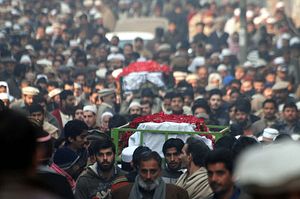Following the attack on a school in Peshawar, newspapers in Pakistan have been flushed with worrisome op-eds and analysis pieces on the country’s failure as a democracy and the consequences of its long cooperation with militant groups.
The criticism by the liberal English media has always existed but the Peshawar attack on a school by the Taliban, which killed more than 140 people, mostly children, swung the country’s civil society into a new urgency to protest. In big cities there have been demonstrations and vigils outside press clubs, and government buildings, many of them calling out terrorism and asking the government to go after the so-called “good” Taliban it formerly embraced over the past decade.
Protests called out on the government’s policy of differentiating between “good” and “bad” Taliban. “All Taliban are bad”, the slogans would say. Some children in protests in Karachi and Islamabad were seen holding placards that flashed, “Good Taliban, bad Taliban, we want dead Taliban.” Many journalists, lawyers and activists have come out in their cities, adding new strength to what had previously become a largely stifled liberal voice over the years.
But as their voice gained strength in the past few weeks, causing a threat to religious groups that either directly or indirectly support the militant mindset of Islam (including those that support the Taliban), their safety has been put at startling risk, with law and order organizations unable to do much to protect them.
In Islamabad, after an independent political candidate, Mohammad Jibran Nasir, led a series of protests outside the controversial Lal Masjid, or Red Mosque, he was threatened by the Taliban: “Stop your protests or you will be responsible for the consequences.” Jibran had gathered hundreds of people outside the symbolic red mosque and called for the police to register a First Information Report (FIR) against Maulana Abdul Aziz, who has publicly defended the Taliban and the dastardly attack on children school in Peshawar. But the 27-year-old political activist said these threats will not deter the civil society anymore. Jibran said, “We are here to save our mosques. Our mosques should preach love and peace. They must present the right spirit of Islam.” After much resistance by the police, an FIR was registered against Abdul Aziz, as the pressure of the protesters grew day after day.
Meanwhile, civil society vigils were physically attacked in Lahore near Liberty Chowk during a commemoration for the slain Salman Taseer, an assassinated governor of Punjab province. A number of unknown militants used batons to charge a group of civil society activists and some workers of the left-wing Awami Workers Party (AWP). The attack came while peaceful activists held candles in memory of the former governor, who was killed by his guard on January 4, 2011 for advocating for a Christian woman accused of blasphemy. People were beaten, many were critically injured, and banners were torn. After the sudden attack, when civil society members moved to register an FIR against the assailants, the police refused to comply. Many supporters went on social media protesting and calling out for support from others to pressure the police to register an FIR. Sherhbano Taseer, the governor’s daughter, tweeted, “Video shows faces of attackers at the vigil today… they hit elderly women and manhandled media.” The District Police was supposed to conduct a speedy and thorough investigation, but so far they have been unable to even identify the attackers.
Former Governor Taseer was a staunch advocate of reforming the controversial blasphemy laws in Pakistan, which have been reportedly misused by religious extremists against minorities including Christians and Shia Muslims. It is important to recount that, after the murder of Salman Taseer, a lot of similar liberal voices who spoke against the law were found to self-censor their opinions on the issue. Politicians and activists who advocated for the reform of the law were also silenced. While the government at the time was moving to amend the law, it reevaluated its decision and let the law remain unchanged.
It is vital to understand how Pakistan as a democracy has been struggling under the religious pied pipers in the country, who have over the past decade gained near unanimous popularity among the masses. Any alternative political voice or efforts by civil rights organizations to call out this mainstream, miscalculated version of Islam have been attacked by “unknown miscreants.” It’s been tough for legal institutions to punish or at times even officially identify these miscreants due to threats against them.
One senior police investigations officer in Islamabad, speaking on the condition of anonymity, told The Diplomat that “in most cases we can identify [the] miscreants behind attacks, but we are bound not to disclose or take any action.”
Many police officials have been threatened by religious parties, especially in cases related to blasphemy law, religious minorities, or the banned militant groups.
While the Pakistani government vowed to pursue action against the Taliban following December’s tragedy in Peshawar, the goal seems impossible to accomplish under a system where civil society has no voice or power to play its vital democratic role. Until Pakistan’s civil society and moderate political voices are given solid support by the state, the country can hardly even begin to fight this monster called Taliban.

































